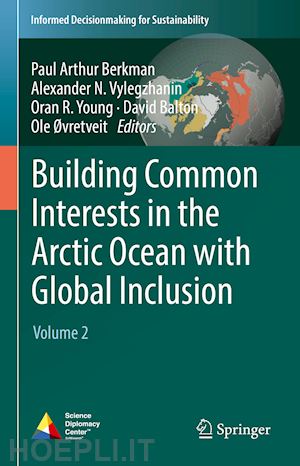
Questo prodotto usufruisce delle SPEDIZIONI GRATIS
selezionando l'opzione Corriere Veloce in fase di ordine.
Pagabile anche con Carta della cultura giovani e del merito, 18App Bonus Cultura e Carta del Docente
PAUL ARTHUR BERKMAN is a science diplomat, applying, training and refining informed decisionmaking to balance national interests and common interests for the benefit of all on Earth across generations. He wintered in Antarctica on a SCUBA research expedition with Scripps Institution of Oceanography in 1981 and became a Visiting Professor at the University of California Los Angeles the following year at the age of 23, beginning to teach about science diplomacy. Paul travelled to all seven continents before the age of thirty, leading to his textbook on Science into Policy: Global Lessons from Antarctica. From research into action, as a Fulbright Distinguished Scholar, Paul chaired the Antarctic Treaty Summit at the Smithsonian Institution, resulting in the first book on Science Diplomacy as well as a Congressional Resolution adopted with unanimous consent by the United States House of Representatives and United States Senate. The followingyear, applying skills of science diplomacy, he co-directed the first formal dialogue between NATO and Russia regarding Environmental Security in the Arctic Ocean, which became the title of an edited book with over 75,000 downloads. Prof. Berkman joined Tufts University from 2015-2020 at the Fletcher School of Law and Diplomacy, where he founded the first Science Diplomacy Center in the world in an academic institution, which is now directed through EvREsearch LTD, where Prof. Berkman has been the Chief Executive Officer since 1999. In 2021, Paul also became Director (from Boston) of the Science Diplomacy Center at MGIMO University in Moscow, creating a unique position to build common interests among allies and adversaries alike. This objective has been explicit throughout his coordinating the Arctic Options / Pan-Arctic Options projects from 2013-2022 with support from national science agencies in the United States, Russian Federation, Norway, France, China and Canada. Prof. Berkman is a Faculty Associate with the Program on Negotiation (PON) at Harvard Law School and Associate Director of Science Diplomacy in the Harvard-MIT Public Disputes Program as well as an Associated Fellow with the United Nations Institute for Training and Research (UNITAR), training science diplomacy and informed decisionmaking with the diplomatic corps of many foreign ministries as well as next-generation leaders inclusively. Paul is senior editor of the Springer book series on Informed Decisionmaking for Sustainability, further triangulating education, research and leadership as elements of lifelong learning “for the benefit of all on Earth across generations.” For his international, interdisciplinary and inclusive contributions, Prof. Berkman has been honoured with awards in the United States, United Kingdom, Switzerland, Russian Federation, Norway, New Zealand and Japan. Most recently,the United States Department of State and Norwegian Ministry of Foreign Affairs awarded Paul the Fulbright Arctic Chair 2021-2022. Paul is happily married with two daughters.
ALEXANDER N. VYLEGZHANIN, Doctor of Law, Professor, is a Head of the Program of International Law, Moscow State Institute of International Relations (MGIMO- University). He is currently elected as a Vice-president of the Russian Association of International Law and a Vice-President of the Russian Association of the Law of the Sea. He is nominated by the Russian Federation to the list of arbitrators according to Annex VII of UNCLOS. He is also elected as a Member of the Presidium of the Committee of Experts on the Arctic and Antarctic of the Council of Federation (the Upper Chamber of the Russian Parliament). His major interest include General International Law, International Law of the Sea, Legal Regimes of Natural Resources, and Boundaries the Arctic. He has publicized a wide arrayof books on international issues, mainly in Russian. Prof. Vylegzhanin was awarded a rank of Academician by the Russian Academy of Natural Sciences (2000), and a Medal by the Russian Academy of Natural Sciences (2001) for his book “Legal Regime of Marine Natural Resources” (2001, in Russian).











Il sito utilizza cookie ed altri strumenti di tracciamento che raccolgono informazioni dal dispositivo dell’utente. Oltre ai cookie tecnici ed analitici aggregati, strettamente necessari per il funzionamento di questo sito web, previo consenso dell’utente possono essere installati cookie di profilazione e marketing e cookie dei social media. Cliccando su “Accetto tutti i cookie” saranno attivate tutte le categorie di cookie. Per accettare solo deterninate categorie di cookie, cliccare invece su “Impostazioni cookie”. Chiudendo il banner o continuando a navigare saranno installati solo cookie tecnici. Per maggiori dettagli, consultare la Cookie Policy.